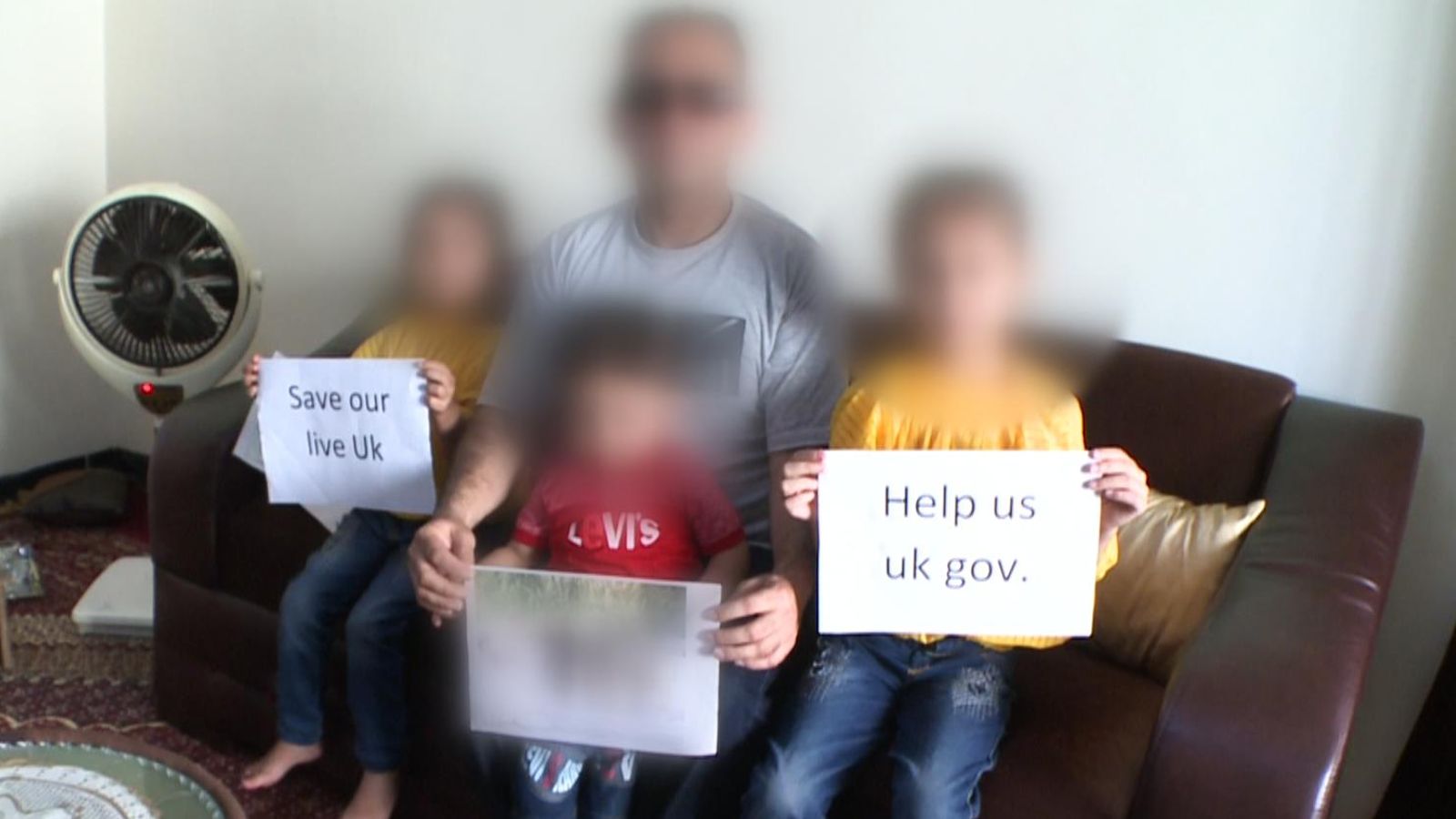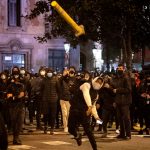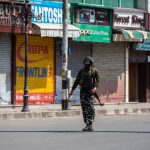In hiding and desperate, two former Afghan interpreters have urged the UK to rescue them from what they see as a Taliban death sentence because they worked for British troops.
Both men, named “N” and “W” to protect their identities, said they applied to a government scheme to be allowed to resettle in Britain, but were rejected because they had been sacked from their interpreting jobs for offences that they said they did not commit.
They said they feared for their lives and for the lives of their families as the Taliban gains ground following a decision by the United States and its allies to withdraw their troops.
“In the coming months the Taliban will get me,” said N, sitting in a house in an Afghan city with his three children.
They held up posters with the words: “Help us UK gov” and “Safe our life UK”.
Sky News is not disclosing where N is staying.
“As soon as possible, they will find me, they will slay me. They will slaughter and behead me and my family,” the 35-year-old said.
“Please save my life, please protect from me. I am abandoned and this is clear.”
W, 31, a father of four young children, communicated separately with Sky News via email from a different city because the mobile phone signal was poor.
It was not possible to send a team to speak with him in person because of the deteriorating security situation.
“Please kindly bring changes in your policy. Do not leave anyone behind who worked for the British forces,” W wrote in response to a list of questions.
“Please pay attention. Please ignore [employment] termination issues,” he said.
“Please provide safety for all interpreters. Please do not leave us for the Taliban. For the battles’ enemies. Please think about our kids and families.”
He continued: “I am absolutely fearful about my life because I already lost my family member. Taliban are stronger than every other time… We feel heartbroken.”
W said the Taliban killed his brother, who had been working as a nurse at hospital run by the charity Medecins Sans Frontieres (Doctors without Borders) in 2017.
“Please we are human, not a robot… Please pay attention,” he added.
Their anxiety appears justified as Taliban fighters took control of much of the capital of northern Afghanistan’s Kunduz province on Sunday in a significant gain, though fighting with government forces was continuing around the city’s airport and other areas.
They also overran government buildings in the northern provincial capital of Sar-e Pul.
The Taliban seized their first provincial capital on Friday, another appeared to fall on Saturday, and several more are under threat.
Increasingly concerned about the fate of Afghan interpreters, a group of more than 40 former military chiefs, commanders and diplomats wrote to Boris Johnson last month to call for greater generosity with the government’s resettlement scheme, called the Afghan Relocations and Assistance Policy (ARAP).
It has already been expanded to help more than 2,300 former interpreters, other staff and their families relocate to the UK, including over 1,000 people in the past few weeks alone.
However, anyone dismissed from their job for certain offences has been rejected. About one third of all Afghan employees for the British military were sacked.
Former military bosses said the Taliban would not distinguish between whether or not an interpreter had lost their job.
They regard anyone who worked for British forces as a traitor who deserves to die.
Please use Chrome browser for a more accessible video player
“I think the principle must be: if in doubt, bring them out. Whereas it seems to be the other way round at the moment and that can’t be right,” said General Lord Richards, who was head of the armed forces between 2010 and 2013 and served in Afghanistan.
“If just one interpreter and his family are injured – or worse still die – as a result of our failure to get them out when we should, then that life will be on the conscience, I hope, of those who are taking these decisions.
“So, they better be pretty certain of why they’re rejecting these applications.”
Afghanistan endgame – where are the Taliban now after 20 years of war?
Lord Richards said the only reason should be if the individual poses a security risk.
N, who worked with British forces in southern Afghanistan between late 2010 and early 2012, said he was accused of smoking drugs and stealing equipment used on foot patrols, such as goggles and knee pads – crimes he strongly denied committing.
“I told my boss… please don’t do this to me. I am not accused of what you are saying,” N said. “This is a misunderstanding.”
For W, who was an interpreter in Helmand province, between 2009 and 2014, he said he too was wrongly accused of smoking marijuana.
Neither men were able to appeal the decision to sack them. W was even then subsequently hired by a contractor and continued working as an interpreter with the military until 2014.
Yet both men have had their applications to relocate to the UK repeatedly rejected.
N described how he felt when his latest claim for help was turned down: “A bad feeling happened to me. I can tell you in reality that I can’t control myself at that time.”
He said: “I should receive the same help from UK to rescue me and my family. If this does not happen… my message is clear that dishonour, shame will be squarely on the feet of UK government and UK nation.”
A spokesperson for the Ministry of Defence said: “We carefully assess each application for relocation under the criteria of the ARAP. Those who were dismissed for serious offences, including those that constitute a crime in the UK or threatened the safety and security of British troops, will continue to be excluded.”






















